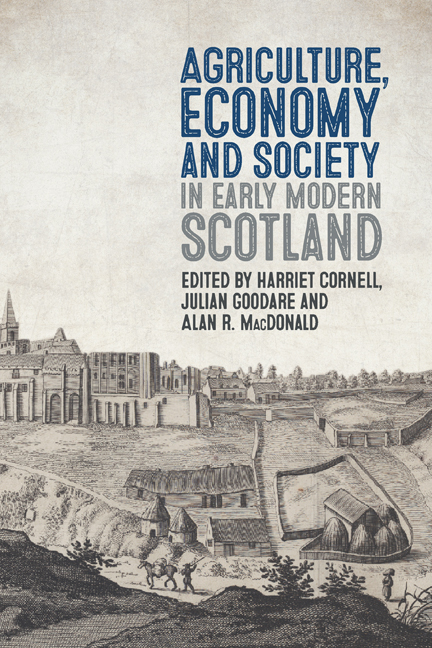Book contents
- Frontmatter
- Dedication
- Contents
- Illustrations
- Contributors
- Acknowledgements
- Note on Currency and Measures
- Abbreviations
- Map of Scotland
- Introduction: Exploring Scotland’s Agricultural History
- 1 Imagining Scottish Agriculture before the Improvers
- 2 The Use of Dykes in Scottish Farming 1500–1700
- 3 The Famine of 1622–23 in Scotland
- 4 Weather and Farming through the Eyes of a Sixteenth-Century Highland Peasant
- 5 Stock, Fermes, Mails and Duties in a Midlothian Barony 1587–89
- 6 The Roots of Improvement: Early Seventeenth-Century Agriculture on the Mains of Dundas, Linlithgowshire
- 7 ‘God Knowis my Sleipis ar Short and Unsound’: Andro Smyth’s Collection of Rent, Tax, Teind and Tolls in Shetland c.1640
- 8 Farming in the Stirling Area 1560–1750
- 9 What Were the Fiars Prices Used For?
- 10 Agriculture and Banking in Eighteenth-Century Scotland 1695–1750
- 11 Capitalism’s Cradle? Ideas, Policies and the Rise of the Scottish Economy in the Mercantilist Age 1600–1800
- Conclusion: A Historiographical and Bibliographical Overview
- Index
- Boydell Studies in Rural History
7 - ‘God Knowis my Sleipis ar Short and Unsound’: Andro Smyth’s Collection of Rent, Tax, Teind and Tolls in Shetland c.1640
Published online by Cambridge University Press: 14 May 2024
- Frontmatter
- Dedication
- Contents
- Illustrations
- Contributors
- Acknowledgements
- Note on Currency and Measures
- Abbreviations
- Map of Scotland
- Introduction: Exploring Scotland’s Agricultural History
- 1 Imagining Scottish Agriculture before the Improvers
- 2 The Use of Dykes in Scottish Farming 1500–1700
- 3 The Famine of 1622–23 in Scotland
- 4 Weather and Farming through the Eyes of a Sixteenth-Century Highland Peasant
- 5 Stock, Fermes, Mails and Duties in a Midlothian Barony 1587–89
- 6 The Roots of Improvement: Early Seventeenth-Century Agriculture on the Mains of Dundas, Linlithgowshire
- 7 ‘God Knowis my Sleipis ar Short and Unsound’: Andro Smyth’s Collection of Rent, Tax, Teind and Tolls in Shetland c.1640
- 8 Farming in the Stirling Area 1560–1750
- 9 What Were the Fiars Prices Used For?
- 10 Agriculture and Banking in Eighteenth-Century Scotland 1695–1750
- 11 Capitalism’s Cradle? Ideas, Policies and the Rise of the Scottish Economy in the Mercantilist Age 1600–1800
- Conclusion: A Historiographical and Bibliographical Overview
- Index
- Boydell Studies in Rural History
Summary
The social and judicial world weighed on his breast like a nightmare.
– Honoré de Balzac, Le Colonel Chabert (1832), ch. 2Over a quarter of a century ago, Roy Campbell issued a plea that historians of Scotland should pay less attention to the Highlands. He said that a certain ‘crucial matter’ – ‘the relations of landowner and tenant in the Lowlands in the [nineteenth] century’ – should instead take centre stage.
Here I utter a parallel request: that Scottish historians should pay more attention to the Northern Isles of Scotland than they have been in the habit of doing. There is, for instance, not a single reference to Shetland or Orkney in Tom Devine's The Scottish Nation 1700–2000 (2000). The reason for this neglect must be a view by historians, but not archaeologists or sociologists, that the affairs of the small-scale northern societies are insignificant. It would be a difficult argument to sustain.
Sometimes the historians blunder about in the history of the north. The late Rosalind Mitchison, writing in 1983, summarised what she thought happened in Orkney and Shetland in the first half of the seventeenth century. Bishop James Law, she said,
enabled James [VI] to create an alternative administration in the Northern Isles, and so to bring down [James’s] cousin [Patrick Stewart,] the earl of Orkney, who was imprisoned and eventually executed … [This new R]oyal control involved an attack on the local culture. The separate laws of the Northern Isles were declared invalid and Scots law was to take over. This gave the opportunity for a Scottish landowning class to enter the Norse society.
It's a dramatic account. I hope to show, by looking closely at an episode around 1640, that it is over-simple and wrong.
* * *
Bishop Law moved from Orkney to Glasgow in 1615. He was succeeded in the north by George Graham, who had been bishop of Dunblane since 1603. Graham had become foster-parent to two lads from Scone, Patrik Smyth and Andro Smyth, sons of a Perthshire laird, and he took them to Orkney. Patrik married the bishop's daughter and became a prominent Orkney laird; Andro, my key figure, made a career with his neat, fluent handwriting, and married a daughter of Harie Aitken, the commissary, another key figure in the new establishment in the islands.
- Type
- Chapter
- Information
- Agriculture, Economy and Society in Early Modern Scotland , pp. 164 - 175Publisher: Boydell & BrewerPrint publication year: 2024

